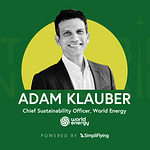In this episode of our ‘Sustainability in the Air’ podcast, Eloa Guillotin, Co-Founder & CEO of Beyond Aero, speaks with SimpliFlying CEO Shashank Nigam, and shares the startup’s hydrogen-electric vision for private aviation. Founded with the purpose of providing a sustainable alternative to traditional private jets, Beyond Aero aims to revolutionise the industry by focusing on the CS-23 certification category for a six-passenger aircraft.
Here are the key highlights of the conversation:
Beyond Aero’s focus on hydrogen-electric private jets (08:52)
Market response and investor interest (11:12)
Technical aspects of Beyond Aero’s hydrogen-electric aircraft (13:06)
Designing a new aircraft from scratch (17:57)
Beyond Aero’s first flight test campaign (21:41)
Customer advisory board and co-designing the aircraft (32:00)
Challenges and opportunities in hydrogen infrastructure (38:44)
Building a diverse and skilled team at Beyond Aero (44:52)
Rapid fire round (50:37)
Keep reading for a quick overview of the episode.
Why does Beyond Aero’s focus on private aviation matter
Private aviation continues to come under fire for its significantly higher carbon footprint. A 2021 report from Transport & Environment (T&E) found that private jets are five to 14 times more polluting per passenger than commercial flights and 50 times more polluting than trains.
By adopting cleaner technologies, like electric and hydrogen-powered aircraft, the private aviation industry can significantly reduce its environmental impact. It can also serve as a platform for testing new and upcoming technologies before they are implemented by commercial aviation.
During the COVID-19 pandemic, Guillotin and her co-founders, Hugo Tarlé and Valentin Chomel, recognised a pressing need for a sustainable alternative to traditional private jets.
After careful consideration and analysis of the market, they decided to focus on developing a fully electric aircraft powered by hydrogen fuel cells, targeting the CS-23 certification category for six-passenger private jets.
Guillotin outlines three key reasons for developing such an aircraft:
Market need: Private jet users are increasingly seeking sustainable alternatives due to personal convictions or societal pressure to reduce emissions. There is a growing demand for electric aviation solutions in this market.
Existing technology: By targeting smaller aircraft (six-seater, CS-23 category), Beyond Aero can leverage existing technologies and work with suppliers to integrate subsystems, rather than developing everything from scratch. This approach allows them to be the final integrator and accelerate the development process.
Certification timeline: Although still ambitious, certifying a smaller CS-23 aircraft is expected to take less time compared to larger aircraft. Beyond Aero anticipates a certification timeline of fewer than 8-10 years for their electric private jet, which is shorter than what would be required for larger aircraft.
These three factors combined make the six-passenger, CS-23 electric private jet an attractive starting point for Beyond Aero to enter the market and work towards their goal of sustainable aviation.
4 ways Beyond Aero is pushing for a sustainable future for private aviation
1. Hydrogen-electric propulsion and aircraft design
With the aim to create a certifiable aircraft that meets the needs of the market, Beyond Aero opted for a clean-sheet design over retrofitting existing jets. Beyond Aero’s One aircraft is designed to be 100% electric, with its engine powered by hydrogen fuel cells rather than conventional lithium batteries. Its patented architecture allows it to have an 800-nautical-mile range.
While other architectures could be used, says Guillotin, such as placing the hydrogen tanks on or below the wings, they may not achieve the desired range, may take longer to certify, or may not appeal to clients expecting a traditional jet appearance.
2. First flight test
In February 2024, Beyond Aero conducted its first flight test campaign using a sub-scale powertrain, becoming the first in France and the second in Europe to fly a hydrogen-powered aircraft. The purpose of the test was to de-risk and validate various technologies, primarily the architecture of the powertrain, albeit on a smaller scale.
A key aspect of the powertrain was its hybrid architecture: a fuel cell and a small lithium battery which served as a buffer and provided power during the climbing phase. Developing the software and intelligence behind this hybrid system was crucial for Beyond Aero. They also collaborated with Formula One and the automobile industry at large to gain insights into hydrogen powertrains used in cars and boats.
3. Challenges and opportunities in hydrogen infrastructure
Addressing the challenges surrounding hydrogen availability and infrastructure, Guillotin emphasises that Beyond Aero is not alone in its pursuit of hydrogen-powered aviation. The company is part of a larger industry shift, particularly in Europe, with major players like Airbus leading the charge and governments and airports investing heavily in the development of hydrogen infrastructure.
Guillotin explains that for hydrogen propulsion to succeed, industry players must work together: airports need to develop hydrogen infrastructure; governments need to provide grants and support; suppliers must work on subsystems and technologies to make hydrogen propulsion certifiable; and certification entities like EASA and FAA must establish hydrogen certification standards.
Beyond Aero has also formed strategic partnerships with over 50 airports worldwide, spearheaded by Aéroports de Paris (ADP), to facilitate the implementation of hydrogen refuelling facilities. By choosing gaseous hydrogen, the company simplifies the process of integrating the infrastructure, making it more feasible for airports to adopt and support hydrogen-powered aircraft.
4. Market response and investor interest
Beyond Aero has received an overwhelmingly positive response from both potential clients and investors. The company has secured over $600 million in letters of intent (LOIs) for around 80 of their planned business aircraft, demonstrating the strong market demand for their product.
The company’s diverse client base includes private jet operators, high-net-worth individuals, and public personalities who are not only eager to adopt sustainable aviation technology but also keen to invest in Beyond Aero’s vision, says Guillotin.
‘Sustainability in the Air’ is the world’s leading podcast dedicated to sustainable aviation. Through in-depth conversations with top aviation leaders, we break through the clutter and provide a clear roadmap for a net-zero future.















